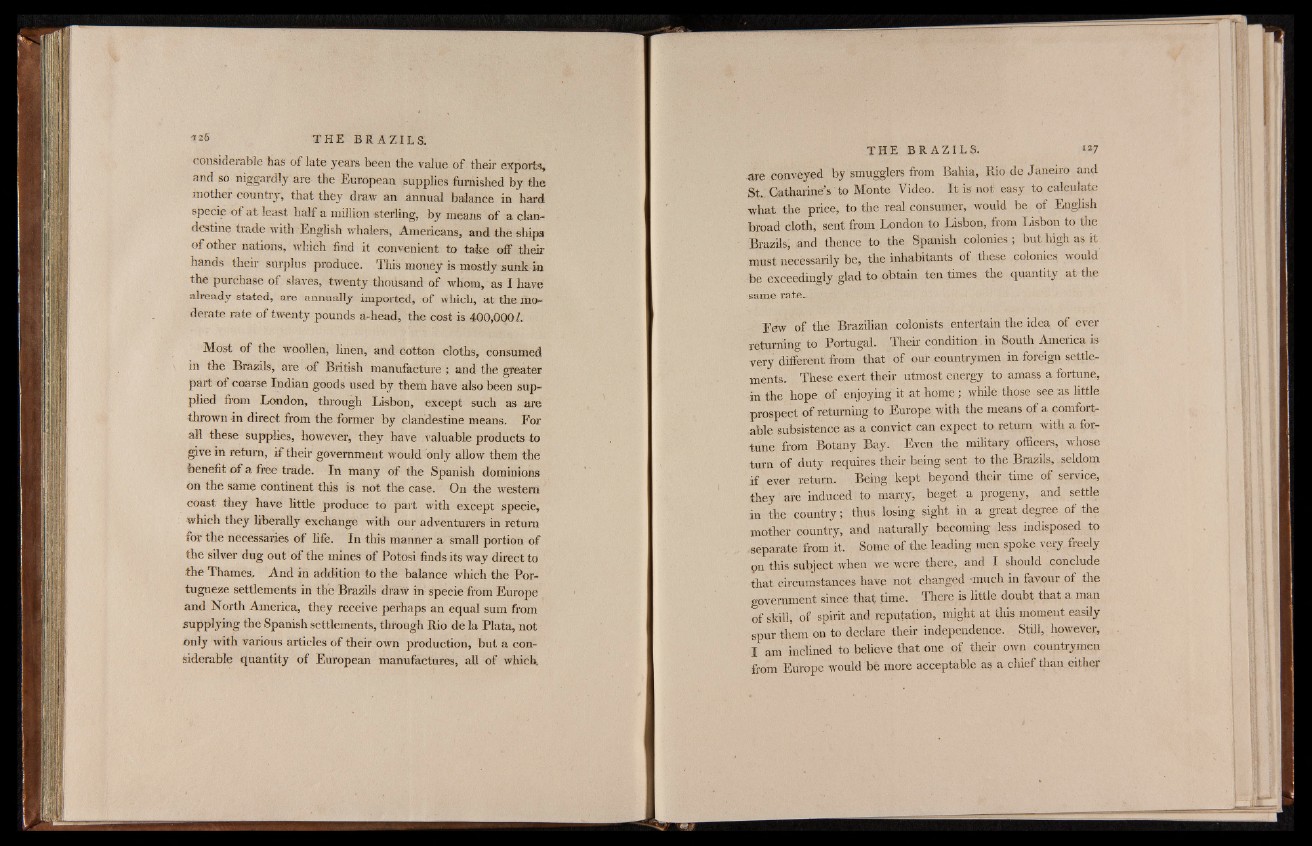
considerable has of late years been the value of their exports,
and so niggardly are the European supplies furnished by the
mother country, that they draw an annual balance in hard
specie of at least half a million sterling, by means of a clandestine
trade with English whalers, Americans, and the ships
of other nations, which find it convenient to take off their
hands their surplus produce, This money is mostly sunk in
the purchase of slaves, twenty thousand of whom, as I have
already stated, are annually imported, of which, at the moderate
rate of twenty pounds a-head, the cost is 400,000 Z.
Most of the woollen, linen, and cotton cloths, consumed
in the Brazils, are of British manufacture; and the greater
part of coarse Indian goods used by them have also been supplied
from London, through Lisbon, except such as are
thrown in direct from the former by clandestine means. For
all these supplies, however, they have valuable products to
give in return, if their government would only allow them the
benefit of a free trade. In many of the Spanish dominions
on the same continent this is not the case. On the western
coast they have little produce to part with except specie,
which they liberally exchange with our adventurers in return
for the necessaries of life. In this manner a small portion of
the silver dug out of the mines of Potosi finds its way direct to
the Thames. And in addition to the balance which the Portugueze
settlements in the Brazils draw in specie from Europe
and North America, they receive perhaps an equal sum from
Supplying the Spanish settlements, through Rio de la Plata, not
only with various articles of their own production, but a considerable
quantity of European manufactures, all of which,
are conveyed by smugglers from Bahia, Rio de Janeiro and
St.. Catharines to Monte Video. It is not easy to calculate
what the price, to the real consumer, would be of English
broad cloth, sent from. London to Lisbon, from Lisbon to the
Brazils, and thence to the Spanish colonies; but high as it
must necessarily be, the inhabitants of these colonies would
be exceedingly glad to obtain ten times, the quantity at the
same rate.
Few of the Brazilian colonists entertain the idea of ever
returning to Portugal. Their condition in South America is
very different from that of our countrymen in foreign settlements.
These exert their utmost energy to amass a fortune,
in the hope of enjoying it at home; while those see as little
prospect of returning to Europe with the means of a comfortable
subsistence as a convict can expect to return with a fortune
from Botany Bay. Even the military officers, whose
turn of duty requires their being sent to the Brazils, seldom
i f ever return. Being kept beyond their time of service,
they are induced to marry, beget a progeny, and settle
in the country; thus losing sight in a great degree of the
mother country, and naturally becoming less indisposed to
-separate from it. Some of the leading men spoke very freely
pn this subject when we were there, and I should conclude
that circumstances have not changed much in favour of the
government since that time. There is little doubt that a man
of skill, of spirit and reputation, might at this moment easily
spur them on to declare their independence. Still, however,
I am inclined to believe that one of their own countrymen
from Europe would be more acceptable as a chief than either